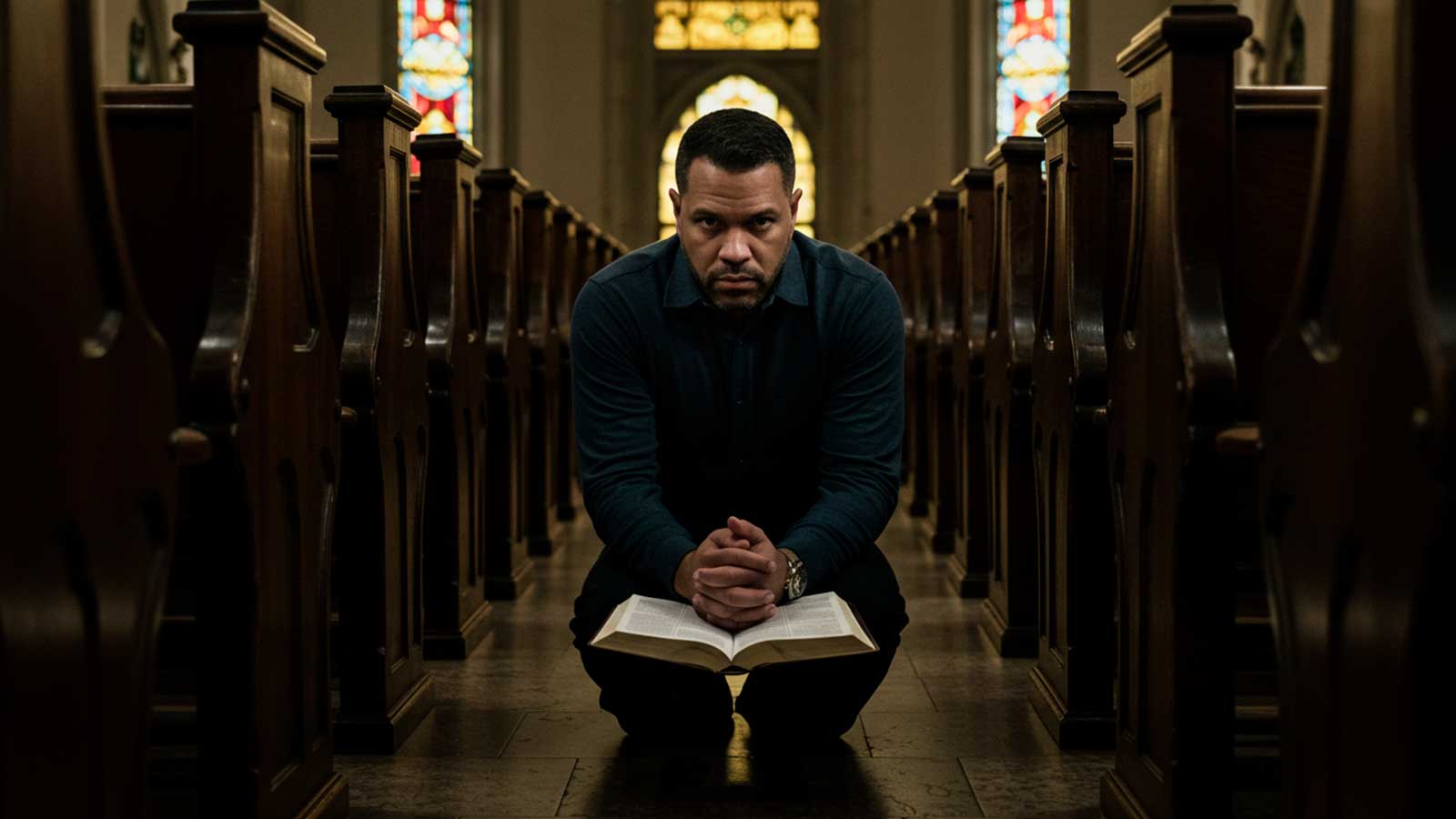Psalm 64 is a profound and strategic prayer by David, pleading for God’s protection against enemies who secretly conspire. As we explore this psalm, we are led to reflect on divine justice, the power of words, and the safety that comes from fully trusting the Lord. This article provides a detailed analysis of Psalm 64, its meanings, practical applications, and timeless spiritual lessons.
Psalm 64 Full Text
¹ Hear my voice, O God, in my prayer; preserve my life from the fear of the enemy.
² Hide me from the secret counsel of the wicked, from the tumult of those who practice iniquity.
³ They sharpen their tongues like swords and bend their bows to shoot their bitter words like arrows,
⁴ that they may shoot in secret at the upright; suddenly they shoot at him and fear not.
⁵ They encourage one another in an evil purpose; they talk of laying snares secretly and say, “Who will see them?”
⁶ They plot injustice; they search out everything they can devise. Both the inward thought and the heart of each one are deep.
⁷ But God will shoot at them with an arrow; suddenly they shall be wounded.
⁸ So they shall make their own tongues fall upon themselves; all who see them shall flee away.
⁹ And all men shall fear and declare the work of God, and wisely consider what He has done.
¹⁰ The righteous shall be glad in the Lord and shall trust in Him, and all the upright in heart shall glory.

Psalm 64 Explained Verse by Verse
Psalm 64:1
Hear my voice, O God, in my prayer; preserve my life from the fear of the enemy.
Explanation:
David opens with an urgent plea. He asks God not only to listen but to protect him from the dread that his enemies inspire. It is a cry for emotional and spiritual deliverance.
Psalm 64:2
Hide me from the secret counsel of the wicked, from the tumult of those who practice iniquity.
Explanation:
The psalmist seeks shelter from hidden plots. He acknowledges that conspiracies and chaos are crafted by evil people and looks for refuge in God’s presence.
Psalm 64:3
They sharpen their tongues like swords and bend their bows to shoot their bitter words like arrows,
Explanation:
Here the attacks are verbal, not physical. Malicious speech can wound like a sword, and harsh words can be fired like arrows.
Psalm 64:4
that they may shoot in secret at the upright; suddenly they shoot at him and fear not.
Explanation:
The enemies operate in darkness, launching accusations or criticisms against the innocent. They feel no fear or remorse, believing their actions will go unnoticed.
Psalm 64:5
They encourage one another in an evil purpose; they talk of laying snares secretly and say, “Who will see them?”
Explanation:
They embolden each other in wickedness and plan ambushes. They assume their deeds will remain hidden and unpunished, as though even God is not watching.
Psalm 64:6
They plot injustice; they search out everything they can devise. Both the inward thought and the heart of each one are deep.
Explanation:
These people scheme with malicious intent, probing for any weakness to exploit. Their hearts are steeped in evil, acting with cunning and concealed perversity.
Psalm 64:7
But God will shoot at them with an arrow; suddenly they shall be wounded.
Explanation:
This is the turning point. God intervenes swiftly and justly. Just as the wicked use arrows (words), the Lord fires His own arrow—His justice—which strikes true.
Psalm 64:8
So they shall make their own tongues fall upon themselves; all who see them shall flee away.
Explanation:
Their own schemes and words backfire. Their lies expose them, and instead of spreading fear, they themselves are shunned.
Psalm 64:9
And all men shall fear and declare the work of God, and wisely consider what He has done.
Explanation:
God’s judgment produces reverent fear. What was hidden becomes public, and all recognize that God has acted. This promotes awe and reflection on divine justice.
Psalm 64:10
The righteous shall be glad in the Lord and shall trust in Him, and all the upright in heart shall glory.
Explanation:
The psalm ends with hope. The righteous are strengthened, finding joy in God and renewing their trust. Victory comes not from human strength but from divine faithfulness.

Historical Context of Psalm 64
Psalm 64 was written by David during a time when he faced hidden threats. Unlike open warfare, he was the target of covert attacks—gossip, lies, and quiet conspiracies. This scenario represents the unseen dangers we face daily and invites us to seek protection in God’s justice.
Who was David at this moment?
David was already renowned for his exploits as a warrior and for his spiritual sensitivity. Yet he was not immune to envy, deceit, and malicious words. Thus, Psalm 64 emerges as an honest expression of the soul seeking refuge and divine action.
Structure of Psalm 64
Psalm 64 contains 10 verses and can be divided into three main sections:
- The cry for God’s protection.
- The description of verbal attacks and hidden traps.
- Confidence in God’s response and its impact on the righteous.
Central Themes of Psalm 64
God’s Justice
One major theme of Psalm 64 is trust in God’s justice. David shows that we do not need to retaliate with hatred, for the Lord knows every heart and acts at the right time.
The Power of Words
The psalm highlights how malicious words can be as lethal as weapons. This warning invites us to reflect on our speech and how we deal with criticism or slander.
Divine Protection Against Hidden Attacks
The attacks in Psalm 64 are silent and carried out in the shadows. This reality leads us to pray wisely, seeking discernment and protection from what we cannot see.
Practical Applications of Psalm 64
How to deal with gossip and slander
David’s example in Psalm 64 teaches us to seek refuge in God instead of retaliating. This strengthens our faith and prevents greater conflicts.
Trust in divine justice
When wronged, we often want to act impulsively. This psalm shows that a just God sees everything—even the hidden things.
Persevere in integrity
Despite the attacks, David remains faithful. Psalm 64 challenges us not to compromise our integrity under external pressure.

Spiritual Reflections Inspired by Psalm 64
Psalm 64 confronts us with deep spiritual truths about how we respond to silent attacks, malicious words, and hidden intentions. It is not only a prayer for justice but also an invitation to introspection and spiritual maturity. Below are reflections to guide your meditation on this psalm:
Have you sought God before reacting to attacks?
David begins the psalm in prayer. Instead of retaliating or seeking justice on his own, he turns immediately to God. This challenges us to adopt the same posture. Faced with criticism, slander, or injustice, our first response should be spiritual, not emotional. Praying before acting is an act of faith and wisdom.
Do you trust that He sees what is hidden from your eyes?
Much of the conflict described in Psalm 64 happens in secret. David cries for protection from concealed meetings and conspiracies. Often, we feel powerless before what we cannot see or prove. This reflection invites us to renew our trust in the God who sees all and knows every heart.
Have you used your words like arrows or like balm?
Words are central in this psalm. The wicked tongue is compared to swords and arrows. This image urges us to reflect on how we use our own speech. Do our words wound or heal? Lift up or tear down? What impact are we generating with what we say?
Psalm 64 serves as a mirror that reveals our stance amid life’s silent conflicts
More than a prayer against evil, Psalm 64 invites us to examine our inner selves. It shows that the greatest conflicts often remain invisible, occurring in the realm of words, intentions, and emotions. Therefore, cultivating an upright heart and trusting in God’s action—even when everything seems too silent—is essential.
Reflecting on this psalm is an opportunity for personal and spiritual growth. It teaches us that even amid invisible traps we can find protection, justice, and peace in God.
Interesting Facts About Psalm 64
- It is classified as an individual lament prayer, common in David’s psalms.
- It contains parallels with other psalms such as Psalm 55 and Psalm 52, also focused on malicious words and betrayals.
- It is often used in devotional readings when emotional and spiritual protection is needed.
How to Meditate on Psalm 64
- Read slowly, internalizing the words.
- Reflect on situations in your life where you were the target of verbal attacks or falsehoods.
- Pray using the verses, applying them to your reality.
FAQ About Psalm 64
What does the expression “sharpened their tongue like a sword” mean?
It refers to using words aggressively and destructively, like weapons intended to wound emotionally.
Does Psalm 64 apply to modern life?
Yes. Many people face subtle criticism, attacks on social media, or hostility at work. The psalm is both current and practical.
Is it wrong to pray for justice?
No. David himself does so in Psalm 64, intending to entrust judgment to God rather than seek personal revenge.
What does “God will shoot at them with an arrow” mean?
It is a metaphor for God’s swift and just response to evil, showing that no one escapes His judgment.
How can I use Psalm 64 in my routine?
You can include it in your daily prayers, especially on days of conflict or when you feel misunderstood.
READ ALSO:
- 50 Beautiful Verses to Strengthen Faith and Heart
- Proverbs 15 – Transformative Reflections
- Birthday Message: Biblical Inspiration to Celebrate
FOLLOW US ON FACEBOOK
We hope you enjoyed it!